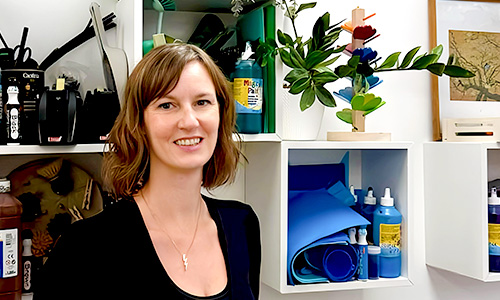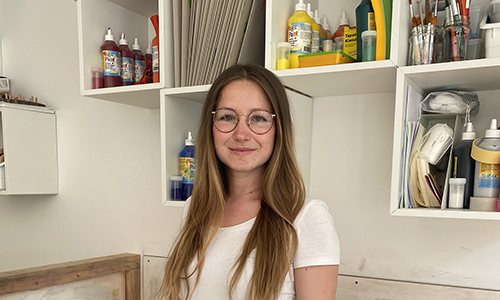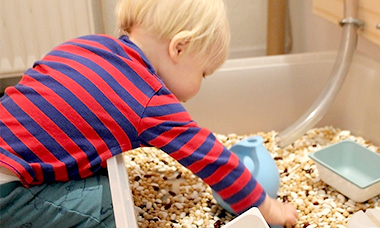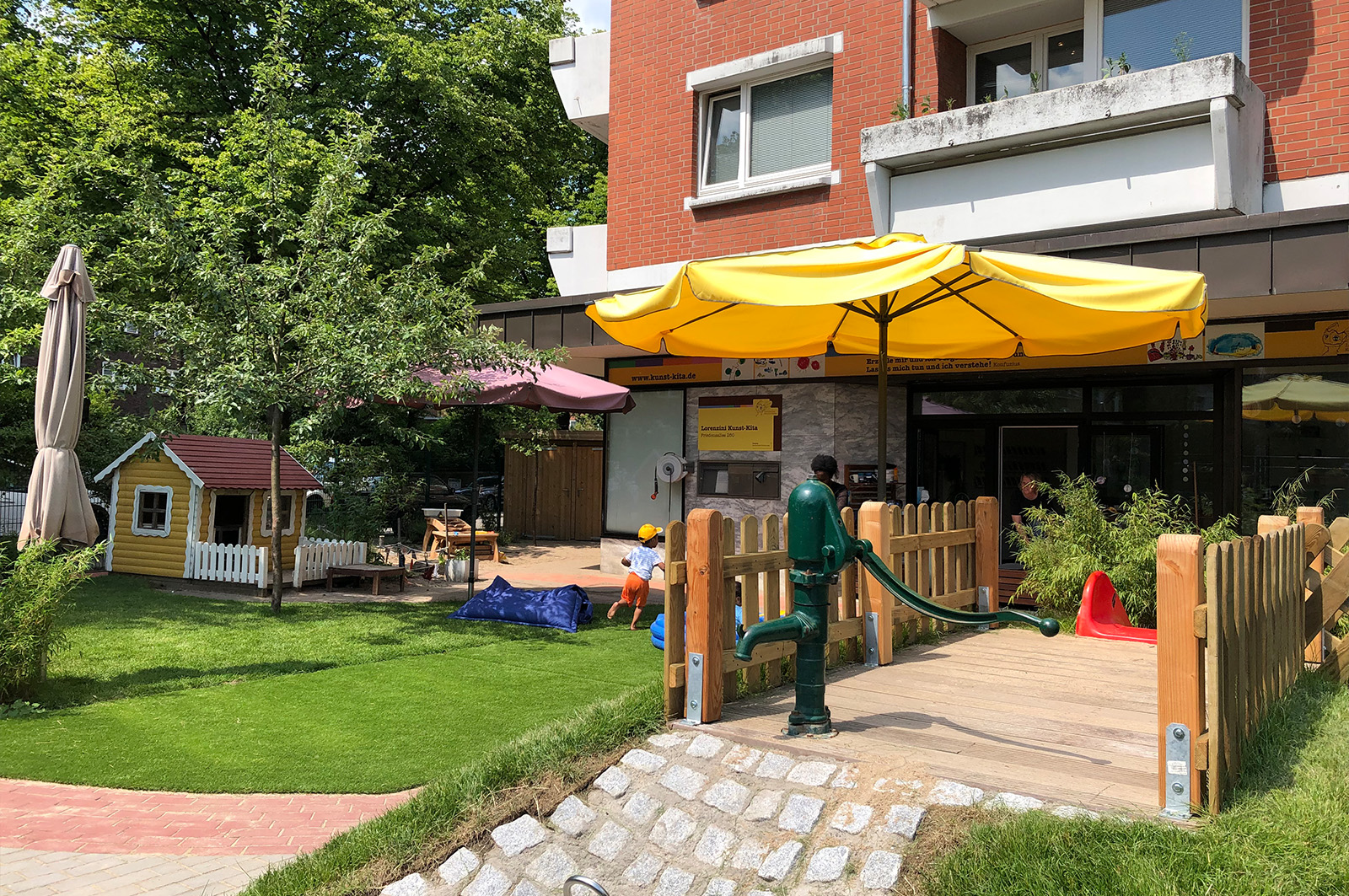Frieda – Art Daycare Center on Friedensallee
Located in Ottensen, near the S-Bahn station Bahrenfeld, our Frieda center at Friedensallee 260 offers 90 spots for both infants and preschool children.
In our light-filled and transparently designed rooms, we embrace the room-within-a- room concept. Our spaces function as "third educators" following the Reggio Emilia approach.
In the infant rooms, children can explore a children's apartment, a studio, an exploration area, a reading nook, and a spacious role-play area. A loft area allows them to view activities from a different perspective.
Right outside our building, our outdoor area invites play. In the summer, the garden is easily accessible from the infant rooms, allowing for continuous outdoor play. We have created various spaces for children here as well, including a water pump for making mud, sandboxes for building, and a Swedish house with a small mini-garden for play.
Our preschool area features three adjacent rooms offering diverse educational and recreational activities. In the role-play room, there is a theater and an apartment. The changeable spaces are set up according to needs or seasons, and might include a pony farm, an ice cream parlor, or a pirate island.
In the building area, preschool children can find blocks, Lego, and natural materials for construction, providing safe and engaging play opportunities. The large studio allows them to bring their creative ideas to life at low tables, wall easels, and workbenches. The extensive material buffets offer a wide range of materials and colors.
In the year before school entry, children visit our adjacent Learning Workshop daily, where they work intensively with learning boxes, Nikitin materials, and Montessori tools. This supports their self-directed learning process and introduces them to letters, numbers, and quantities.
Lorenzini Art Daycare Center Frieda is conveniently located near the following Hamburg districts: Ottensen, Bahrenfeld, Altona-Nord, Neue Mitte Altona, Groß Flottbek, Othmarschen, Altona, Altona Altstadt, Kolbenhöfe, Gaswerk, Johann-Mohr- Weg, and Othmarschen Park.
Contact us now!Location
Lorenzini Kunst-Kita Friedensallee GmbH
Friedensallee 260 · 22763 Hamburg
Contact
Email: frieda@kunst-kita.de
Phone: 040/85 18 67 41
Spaces Available
30 Infant Spots
65 Preschool Spots
Opening Hours
Monday to Thursday: 7:30 AM - 6:00 PM Friday: 7:30 AM - 5:00 PM

Daten von OpenStreetMap - Veröffentlicht unter ODbL
Leitung

Jana Berndt
Head of Education

Angelina Köster
Deputy Head
My passion is to provide children with ample freedom to develop. From a young age, each of us has great potential that can be nurtured and realized through guidance and support from the start. Even as adults, we can learn so much from the youngest among us. Courage is the driving force that propels both us and the children forward.
Your Insight into the Art Kindergarten Frieda and Baki
This short video takes you on a journey into our Art Kindergarten Frieda and Baki. Here, you'll learn all about our team, our unique concept, and hear what parents particularly love about our kindergarten.
Contact us now!Education, Connection, and Loving Care ...
... for a successful start in the infant program!
In our five locations, we care for about 30 infants aged one to three years in each facility, with a staff-to-child ratio of one educator for every five infants.
When children join us, they are acclimatized using the Berlin model, as our primary goal is to create a strong and secure bond between the educator and the child. A sense of security and familiarity lays the foundation for enjoyable and effective educational work. The Berlin model involves a gentle acclimatization process with the participation of a parent and the future primary caregiver. Initially, the child visits the center briefly and with a parent, gradually increasing their time at the center over the following days and weeks. This process leads to a reliable and positive attachment. Our acclimatization process typically lasts around four weeks.
Learn more!
Did you know ...
-
... that it can be beneficial for children to attend a daycare or childcare service from as early as their first birthday? At this age, children start engaging more with their surroundings and begin to explore their environment in a curious manner.
-
... that children benefit from starting daycare early? Being in a group with children from diverse social backgrounds promotes healthy development. In the daycare environment, children quickly learn to be part of a community, understand the importance of waiting and patience - an essential social skill for life. Additionally, children who attend daycare tend to have more self-confidence compared to those who are cared for at home.
-
... that learning can happen simply by observing and watching other children play?
-
... that at home, children are often "in the background"? They may accompany a parent when they go shopping, cook, work, or do other activities, but the amount of time spent solely focused on the child is relatively short. In contrast, a daycare day is filled with experiences like playing, singing, and crafting - activities specifically designed for children, which parents at home might not be able to provide.
As you can see, we think carefully about how best to support your child’s development. You can find more details in our educational concept. 😉
We Foster Creativity and Cognitive Skills in Preschool Children
We love art. However, our clear identity as the original Hamburg Art Daycare Center is not an end in itself. While early engagement with art and creativity is a lot of fun, it is through the Reggio Emilia approach that children learn to educate themselves, laying the foundation for lifelong learning, academic achievement, and ultimately, career success.
In our preschool rooms, the consistent implementation of the room-within-a-room concept offers numerous opportunities for play, exploration, and learning. With areas such as a building corner, stage, reading lounge, mini-apartment, and a Montessori- style play area, we provide an excellent framework for self-directed education. Children can choose between their need for activity or quiet and engage with the changing educational offers from our educators according to their own interests.
Learn More!
Our Educational Concept ...
... proven and structured!
Loris Malaguzzi, founder of the Reggio Emilia approach, writes in his poem “The Hundred Languages of Children” that a child has a hundred languages, a hundred hands, a hundred ways of thinking, speaking, and playing, a hundred worlds to discover, a hundred worlds to dream.
Our goal is to preserve this diversity of languages, thoughts, approaches, and dreams while addressing the risk that a child’s innate openness might be overshadowed by the often one-sided influences of society.
The Reggio Emilia approach is based on the belief that every child is capable of self- education and interaction within a social context from the very beginning. Children are thus the architects of their own reality and development. The community acts as a co- constructor, and the environment plays a crucial role as the "third educator." The spaces within the center function as a rich environment, offering children both stimulation and challenges as well as comfort and opportunities for retreat.
Learn more!















